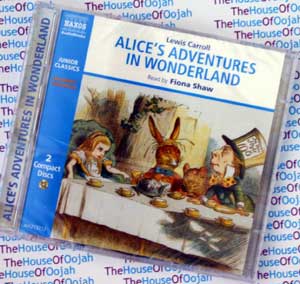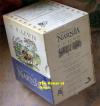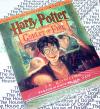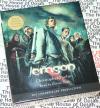Alice's Adventures in Wonderland - Lewis Carroll - Audio Book CD NEW Unabridged

Alice's Adventures in Wonderlandby Lewis Carroll read by Fiona ShawGet other Childrens AudioBooks click here |
 |
Alice's Adventures in Wonderland - by Lewis Carroll - Audio Book CDBrand New ( 2.5 hours 2 CDs): There are at least two ways of reading this classic children’s tale. One may either regard it as an innocently inventive and diverting piece for readers of all ages — or one may choose to bring to bear on it the full weight of academic analysis, be it literary, mathematical, philosophical or psychoanalytical.The book was first published in 1865 and 1871, and has been hugely popular ever since. Unlike most Victorian children’s books (including Carroll’s own Sylvie and Bruno) it is refreshingly unmoralistic and brilliantly imaginative. Perhaps one might see it as a pioneering work in the rich tradition of British children’s writing, which includes (for example), The Wind in the Willows, the Pooh books and the animal tales of Beatrix Potter. But Alice is in many respects more demanding and disturbing — even children unaware of symbolic interpretation may well be haunted or discomfited by the dream worlds Carroll has created, worlds where it is not quite enough to say that nonsense prevails since there is almost always a kind of perverse or inverted logic at work.In Alice’s Adventures in Wonderland the child heroine dreams the experiences, which constitute the story, and (of course) wakes at the end to tell her sister what has happened. The dream world of Wonderland is peopled largely by creatures, which speak, feel and behave much like caricatured human beings: the White Rabbit, for instance, is clearly neurotically obsessed by time and terrified of authority, while the playing-card King and Queen of Hearts bicker like an ill-matched, long-married couple. Anger, violence and the threat of violence are real enough within the dream-world — the dormouse is scalded and dunked at the Mad Hatter’s Tea Party — while irritation and disillusionment seem more common than contentment — witness the doleful narrative of the Mock Turtle. At times, Alice seems to be in real danger, whether from flying saucepans in the Duchess’ kitchen or from the attentions of a gigantic puppy, but at last she is able to break free from the suffocating power of her fantasy by exclaiming, after she has regained her normal size, ‘Why, you’re nothing but a pack of cards!’Child listeners will surely be delighted by the picaresque variety of the story, but adults may wonder about some possible deeper or unifying interpretation. Freudian readings are legion, but it may be more interesting to see the adventure as a disturbing challenge to our conventional notions of reality. Carroll repeatedly asks questions about the nature of time or the meaning of names, poses mathematical paradoxes and semantic quibbles - and the effect of this is to promote an acute unease, a fundamental, perhaps existential, uncertainty about meaning and purpose. Martin Gardner (editor of The Annotated Alice) suggests that ‘the last level of metaphor in the Alice books is this: that life, viewed rationally and without illusion, appears to be a nonsense tale told by a mathematician.’This, of course, is appropriate because Lewis Carroll (1832-1898, real name Charles Dodgson) was in fact a lecturer in Mathematics at Christ Church, Oxford, where he had been an undergraduate after schooling at Rugby. He was devoted to all kinds of puzzles, conjuring and games, especially where a mathematical or logical element was involved; he was also a keen and skilled amateur photographer in the early years of that art. Above all, Carroll was devoted to children, or rather to little girls, and Alice was based on stories that were originally told to the daughters of H.G. Liddell, Dean of Christ Church. His interest in little girls seems to have been entirely innocent, at least at a conscious level, and (perhaps surprisingly to modern parents) he was allowed to photograph or sketch them in various stages of undress. He never married, and appears to have been quite content with the life of a bachelor Oxford don, in spite of the almost absurd philosophy of Alice, Carroll was firmly orthodox in his Christian belief, and once wrote, ‘My life is so strangely free from all trial and trouble that I cannot doubt my own happiness is one of the talents entrusted to me to ‘occupy’ with, till the Master shall return, by doing something to make other lives happy.’ About the Reader Fiona ShawFiona Shaw has won the Olivier Award for Best Actress four times, as well as a clutch of other awards, for her roles in As You Like It, Electra, The Good Person of Sechuan, Hedda Gabler and Machinal. Her interpretation of Richard II was widely acclaimed, as is her work in films such as My Left Foot, Jane Eyre and Anna Karenina.
About the Author Lewis CarrollLewis Carroll is the pseudonym of the English writer and mathematician Charles Lutwidge Dodgson, b. Jan. 27, 1832, d. Jan. 14, 1898, known especially for ALICE'S ADVENTURES IN WONDERLAND (1865) and THROUGH THE LOOKING GLASS (1872), children's books that are also distinguished as satire and as examples of verbal wit. Carroll invented his pen name by translating his first two names into the Latin "Carolus Lodovicus" and then anglicizing it into "Lewis Carroll." The son of a clergyman and the firstborn of 11 children, Carroll began at an early age to entertain himself and his family with magic tricks, marionette shows, and poems written for homemade newspapers. From 1846 to 1850 he attended Rugby School; he graduated from Christ Church College, Oxford, in 1854. Carroll remained there, lecturing on mathematics and writing treatises and guides for students. Although he took deacon's orders in 1861, Carroll was never ordained a priest, partly because he was afflicted with a stammer that made preaching difficult and partly, perhaps, because he had discovered other interests. The young adult Charles Dodgson was about six feet tall, slender and handsome, with curling brown hair and blue or grey eyes (depending on the account). He was described in later life as somewhat asymmetrical, and as carrying himself rather stiffly and awkwardly, though this may be on account of a knee injury sustained in middle age. As a very young child, he suffered a fever that left him deaf in one ear. At the age of seventeen, he suffered a severe attack of whooping cough, which was probably responsible for his chronically weak chest in later life. Another defect he carried into adulthood was what he referred to as his "hesitation", a stammer he acquired in early childhood and which plagued him throughout his life Carroll's comic and children's works also include The Hunting of the Snark (1876), two collections of humorous verse, and the two parts of Sylvie and Bruno (1889, 1893), unsuccessful attempts to re-create the Alice fantasies. As a mathematician, Carroll was conservative and derivative. As a logician, he was more interested in logic as a game than as an instrument for testing reason. In his diversions as a photographer and author of comic fantasy, he is most memorable and original--the man who, for example, contributed, in "Jabberwocky," the word chortle, a portmanteau word that combines "snort" and "chuckle," to the English language. DONALD J. GRAY
|
Alice's Adventures in Wonderland - by Lewis Carroll - Audio Book CD |

 0 Items (Empty)
0 Items (Empty)








